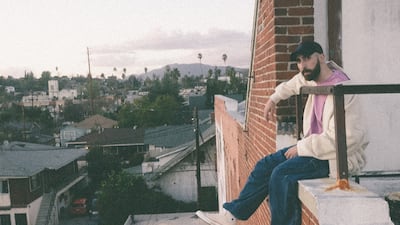Like chefs, popular musicians rarely explain the secret sauce in their hits.
This is what makes Palestinian-Jordanian singer-songwriter Llunr, real name Bader Khatib, refreshing to his fans.
When his latest track Rocketship charted in Spotify’s Viral 50 lists in North America, European and Asian territories in May, Khatib went on TikTok to share the inspirations behind the anthemic hit.
“What if Imagine Dragons [and] Coldplay, with a sprinkle of the Lumineers and One Republic, came together and made a song?” he joked, before pretending to run these bands through a fake AI generator.
Talking to The National from Amman, he is unapologetic about his influences and says he fulfilled the song’s potential in the studio.
“In the demo phase of the track, the team and I heard something that was a bit special,” he recalls. “We heard a big stadium sound and we really wanted to harness that for the whole record.
“Our initial aim was not to get to that point, but we followed the inspiration, and this was the outcome.”
The song’s success allowed Khatib to become a fully fledged professional musician.
“I quit my job this year to do this full time, so I am very grateful for the support,” he says. “I took this step because I realised I reached a point in my life that if I didn't really give it my best I was going to regret it.”
The move marked the end of a series of jobs Khatib has had over the years, including as a voice-over artist, radio host and penning advertising jingles.
Looking back at that period, he says his music career began on a fortuitous note.
“The first song I ever released was Cold in 2018 and that came on the first day that Spotify arrived in Jordan, so that was a good sign,” he says.
“But that was all it was. From where I am in Jordan as an independent artist, it is all about the need to keep perfecting your craft, releasing more songs and building on whatever success you have.”
Indeed, Khatib garnered a following through songs Some Type, I Understand and Doo Doo Doo – filled with mellow and emotive vocals, alongside some refreshingly understated electronic and acoustic arrangements.
The latter resulted in his first brush with success, as 400,000 people made their own TikTok videos using Doo Doo Doo, and Khatib was subsequently signed by US record label Empire.
For someone so open about the songwriting process, why does Khatib think Doo Doo Doo, became a social media hit?
“The ukulele. And that mixture of Arabic and English lyrics,” he says after some thought.
“Many of us who grew up in the region are bilingual and in my case my Arabic is not really as strong as it can be. I am working on it, and I really want to make it stronger.
“But at the same time, I do want to express myself and I know there are others in the same situation as me.
“While not all of my music is bilingual, I am happy I made something that speaks for that audience as well.”
Khatib has also reached out to potentially new listeners by appearing on GG Geena, the official anthem for electronic gaming festival Gamers8, running in Riyadh until August 31.
A collaboration with Saudi-Ecuadorian singer Mishaal, it is a catchy melange of pop and the Saudi electro folk stylings of sheilat.
With the latter genre responsible for more than one billion streams across online platforms, Khatib says the future is bright for the next generation of regional artists.
“Social media and streaming are playing a big role with artists nowadays, not just only making music,” he says.
“We are creating content, vlogs, editing and taking on different roles. It can be a lot of work, but it gives artists from this region the kind of exposure we never had before.”


